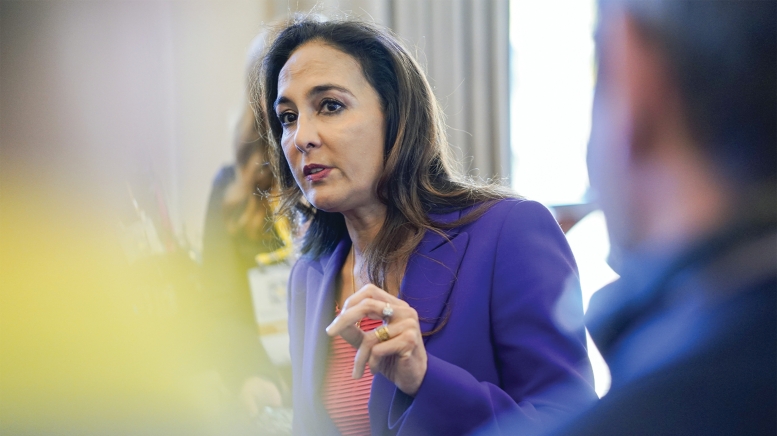To the New Editor
You had me at “I led the Spotlight investigative team…” [“A New Chapter Begins at DAM,” September/October]. Kudos on your debut. Welcome to Dartmouth.
Here are just a few reactions off the top. I, too, am disappointed but not surprised in the administration’s limp response to the corruption and autocracy in Washington, D.C. [“Your Turn”]. Good luck to Joseph Catrino [“Designer Mindset”]. I would hate to be graduating these days, looking for a job, and trying to find a way to pay off that $100,000-a-year debt.
Probably the less said about Harmeet Dhillon ’89 the better [“From Advocate to Enforcer”]. Her thoughts on the First Amendment disgust me and, I suspect, would have disgusted John Mecklin ’39 [“On the Frontlines”]. What contrasting bookends. If you played an editorial role in that, kudos. Compliments to Matthew Mosk ’92 and Sue Shock for good reporting. And thanks for Lisa Furlong’s interview with Marty Cetron ’81 [“Continuing Ed”]. Prior to the Covid business, I wrote a piece regarding the future H5N1 pandemic. We are far worse off now.
Finally, the focus on the Hop was well chosen [“Stage Legends of the Hop”]. Ushering concerts let me appreciate Aaron Copeland himself; the Film Society is among the best in the country; and art seeped into my mental and emotional DNA. The Hop is a jewel in the crown.
Enjoy your editorship. So far, I do.
FRANK STECH ’68
Glenn Dale, Maryland
The September/October issue just arrived, and I was struck by its freshness. Not that what DAM used to be under the prior editor left anything to be desired, but I felt a surge of renewal. As a big fan of The Boston Globe, I look forward to your new vision for our magazine. Best wishes going forward.
RICHARD JENSON ’69
Harvard, Massachusetts
Pushback
Several statements by Harmeet Dhillon cause me great concern [“From Advocate to Enforcer”]. On taking over the Civil Rights Division at the Department of Justice [DOJ], she says it will continue “to enforce federal civil rights laws but in a more even-handed fashion, consistent with the president’s executive orders.” That caused more than 200 lawyers to leave.
My understanding is that the DOJ is to enforce the law according to the statutes passed by the U.S. Congress and consistent with the Constitution—not according to the whims of any president. If more than 200 lawyers resigned due to Dhillon’s change in direction, maybe the writer should ask some of those 200 why—and not rely on the head of the department. One of the things I learned at Dartmouth was who to ask questions of: One does not ask the slaveholder if slavery is good for the slaves.
She goes on to say, “If you have a student visa or a green card, you don’t have the same license to express your views as American citizens do.” Really? The First Amendment talks about the “rights of the people.” It does not limit those rights to citizens. Except for voting rights, the terms “people” or “persons,” not “citizen,” are used in the Constitution.
DON RIES ’66
Tucson, Arizona
Harmeet Dhillon’s most famous contribution during her time in Hanover was an antisemitic op-ed against the College’s first Jewish president. Today she is responsible for rolling back diversity, equity, and inclusion initiatives and attacking academic freedom by freezing federal funds at Dartmouth’s peer institutions. When she calls Dartmouth “one of the good guys,” there is no stronger signal that we have become one of the bad guys.
SARAH STERN ’08, TU’13
San Francisco
I am so disappointed to see the Trump administration’s perversion of our nation’s anti-discrimination laws echoed without criticism and context in the online DAM [“Top Trump Official Calls Dartmouth ‘One of the Good Guys’ ”]. I appreciate that you included a link to the commentary by Robert Reich ’68, but that is insufficient to relay the immense hypocrisy of the current DOJ’s use of “anti-discrimination” rhetoric to quash dissenting voices in higher education while that administration is actively discriminating against people of color, immigrants, supporters of Palestine, and LGBTQ+ people.
Is support for the current federal administration the direction Dartmouth is heading in and even celebrating? If so, I’m so sad to see it.
JULIA MARKS ’09
Seattle
Free Speech
It is embarrassing that a Dartmouth graduate would say, as Harmeet Dhillon ’89 was quoted [“From Advocate to Enforcer,” September/October], “If you have a student visa or a green card, you don’t have the same license to express your views as American citizens do. That’s just a fact.”
No, that is not a fact. As an attorney, surely, she has heard of the First Amendment, protecting the right to free speech. If not, she should give up her bar card. I am not aware of any law that restricts the right to free speech to American citizens. There is no requirement that visitors to this land must agree with the views and policies of the government. They should be and are free to express their opinions, and, as long as those opinions comport with the very limited restriction on free speech having to do with threatening others and provoking violence, they nourish the civil debate of ideas as envisioned by the Founding Fathers.
PETER McKEEVER ’70
Monona, Wisconsin
Leading the Way
Thank you so much for featuring Harmeet Dhillon in her new position as assistant attorney general for civil rights. For years, I have found Harmeet to be one of the most clear-minded and articulate advocates of the conservative agenda, and I take great pride in her Dartmouth affiliation. Moreover, it’s good to know that Dartmouth is leading the way in correcting some of the civil rights violations on college campuses.
DAVE VOSS ’77
Rockford, Illinois
I find it hard to imagine why the new editor of the DAM, a journalist who formerly led the “Spotlight” investigative team at The Boston Globe, would countenance the puff piece interview of Harmeet Dhillon. Kudos to her for bringing herself up by her bootstraps, if indeed that is what she did. But to pretend the current U.S. Department of Justice (DOJ) is nonpartisan is to willfully blind yourself to what is happening there. To pretend that consent decrees have improved conditions in the streets of our cities and the tiers and solitary confinement wings in our prisons is to willfully blind yourself to the experiences of Black people and people with mental illness all over our country.
To accept—without a single even lame pushback—that there is any rationale for a “Second Amendment section of the Civil Rights Division” is to act as if the hundreds of millions of guns and gun owners need protection by the very government that the original Second Amendment was written to protect us from. And to act as if it is a good thing that highly experienced personnel can’t get out of U.S. DOJ fast enough—well, it’s no wonder the clowns left behind cannot get grand juries to indict a salami sandwich-throwing D.C. resident.
Shame on DAM for publishing this drivel.
ERIK ROSKES ’86
Baltimore
If the likes of Harmeet Dhillon believe that Dartmouth is “leading the way” and “really one of the good guys,” then I grieve for the institution I have supported and loved for the better part of six decades.
THOMAS E. PEISCH ’70
Wellesley, Massachusetts
I write concerning your interview with Harmeet Dhillon. You are aware, I assume, that this alum is the person who requested one day in jail for the Louisville, Kentucky, police officer who was convicted of civil rights violations in the Breonna Taylor incident; canceling agreements that monitor police for racism; abandoning pending civil rights litigation; and generally dismantling the Civil Rights Division, to say nothing of her undergrad article in The Dartmouth Review alleging a “holocaust against conservatives” attacking then-President James Freedman.
No questions about any of that in this puff piece Q&A. If you are attempting to quell concern at Dartmouth’s perceived capitulation to the Trump administration, this is not going to do it.
PETER SCHENCK ’69
Ardmore, Pennsylvania
Champions
I very much enjoyed your “Gridiron Glory” feature [September/October] about the 1925 national championship team. The captain of that team—Nate Parker, class of 1926—was an All-American footballer and a Rhodes scholar. I came to know him in the summer of 1967 working in his brokerage firm as I prepared for my freshman year at Dartmouth. I commuted back and forth daily, about an hour in each direction. To help with the commute, Mr. Parker and his son (also Nate, class of 1952) occasionally hosted me at their homes.
The Parkers were both major figures in my life. Young Nate brought me back to Pittsburgh in late 1974, and I joined him working at his firm. In early 1979, President Kemeny came to Pittsburgh to meet with our local Dartmouth club. I arranged with Coach Yukica a game ball (the 1978 team was the Ivy football champion), and President Kemeny presented the game ball to Mr. Parker, who at age 73 was able to catch a somewhat errant pass the president threw across the room.
Through the years I spent in Pittsburgh working with young Nate, I would sometimes encounter Mr. Parker. He was friendly—not effusive—and always made me feel as though the encounter made his day.
One footnote: Forty-five years after the 1925 national championship and my senior year at Dartmouth, our 1970 team was also undefeated. We didn’t win the national championship, but we were the first Ivy League football team since 1960 that ended the season ranked in the top 20 by AP (14th), and the last to be so ranked.
BRAD HOUSER ’71
Sarasota, Florida
Federal Funding
How did we get to the point where academic standing was so heavily dependent on government-funded research—especially in the sciences [“Three Questions for President Sian Beilock,” July/August]? How did we get to the point where federal funding was so high that the government felt entitled to control supposedly private institutions to the point where withdrawal of federal funding could bring a supposedly private university to its knees?
We need to brainstorm how Dartmouth can truly become an independent, private college/university—not a branch of the National Science Foundation or the National Institutes of Health. We need to think about how we can evaluate academic performance without reference to how many federal dollars a faculty member can bring in. We need to look at how we can do science more cheaply.
ANNE BARSCHALL ’78
Tarrytown, New York
Brazen Attacks
The Dartmouth Club of Idaho invited College alumni to a September get-together at a Boise winery. A family member had surgery the day before, so I could not go. Beyond that, the only alumni meeting I would attend is one opposing the Trump administration’s authoritarian takeover of our cities, institutions, and foreign policy. I also strongly oppose President Beilock’s utter failure to take a strong stand against Trump’s brazen attacks on academic freedom and scientific research in the United States. She even went so far as to assert that College faculty and staff should “only comment on matters that concern us” (paraphrasing).
If an impending dictatorship doesn’t concern us all, why did Dartmouth alumni bother to get an excellent liberal arts education? Wake up! Less wine and more activism! Even if you disagree with my point of view, doesn’t defending democracy and the Constitution unite us all?
WILL BROWNING ’78
Nampa, Idaho
A Burning Question
Norman Maclean, class of 1924, was my mom’s English professor at University of Chicago. [Instagram, “Leading man embraces Dartmouth; Dartmouth swoons,” April 1987”; “A Tragedy Runs Through It,” March/April 2021]. Mary Bell Clark, who became like a grandmother to me, had worked as a housekeeper for Maclean, and he recommended my mom hire Mary to help with housework. So, she joined the army of Black women who took several train rides to get from the South Side to the North Shore to work.
One day I was trying to start a fire at our house in Glencoe, and when Mary came through the room, I said, “I can’t get this wood to burn.” Mary said, “Wood does not burn.” “Say what? Mary told me that when wood heats up it releases gases, which burn. I never thought of fire the same way again. Just a couple of years ago I read Young Men and Fire.” Somewhere in there, Maclean wanted to know how wood burns and went and found a University of Chicago chemist and asked how wood burns. Chemist said, “Wood does not burn.” “Say what?” Chemist told Maclean what Mary told me, and I surmise that one day a startled Maclean came home and asked Mary if she knew how wood burns.
When the movie A River Runs Through It premiered, Mary told me, “Mr. Maclean sent a limousine to pick me up and seated me in the center of the front row.”
What a mensch!
I end by pointing out that the book and movie are pretty good, but the title is tian xia di yi (Mandarin for “first under heaven”). I can’t remember how many articles I’ve seen with a title like “A Highway Runs Through It” (about destroyed old neighborhoods) or “A River Used to Run Through It” (for the dry Santa Cruz River in my hometown).
ERIK SHAPIRO
Tucson, Arizona





